#lands on food
Explore tagged Tumblr posts
Text

I was recently looking at a general knowledge book for my daughter, Be a Bee, and it mentioned that there are many categories of flies, with lots of different types.
You and I only know two:
One is the housefly, which will go wherever it can find food. If there's food, it will land on that; if there's garbage, it will land on that; and it will even sit on waste. It doesn't matter to it.
If there's a wound, it will keep coming back to that wound for food. There are many people like this, who go wherever life takes them. Any friend who shows up or any chance to waste time, they will take it.
On the other hand, the second type of fly we know is the bee. It ignores everything else in the world and goes straight to the flower, where it makes delicious honey.
Also Read: Understanding Vital Signs: A Guide to Your Body's Basic Medical Metrics
So, it’s all about your choices. If you’re okay with anything, then you will get anything in life. The certainties are clear: you will get exactly what you want at the end of the day.
Vikram Sharma...
Facebook infoincharge
#motivation#diary#general knowledge book#categories of flies#types of flies#housefly#find food#lands on food#lands on garbage#sits on waste#flies on wounds#people like flies#waste time#life choices#second type of fly#bee#ignores distractions#focus on flowers#delicious honey#life is about choices#get anything in life#certainty in life choices#results of choices#focus on what you want#life direction#personal focus#purpose-driven life
1 note
·
View note
Text
So I'm leaving work and something darts in front of me, maybe 10ft away, too fast for me to see what it is. Peek around the tree blocking my path and I see this

Just like... a whole ass hawk. Dude's gotta be about 1.5ft tall. Massive fucking bird. And it's just staring me straight in my soul like this, even as I try to move ahead. It didn't budge. And there's only this path back to my car unless I want to walk on a busy highway. So I have the option of Death By Raptor or Death By Truck.
So I walk in the poison ivy filled patch off the sidewalk. Guy still isn't moving. Still staring me directly in the eyes. And I do this thing when animals are behaving strangely where I'll talk to them, so I'm just like, "Hey, man. I don't know you. You don't know me. This feels really threatening. I'm just trying to get to my car, dude. Can I get some space please? You're a big fucking bird. I see those claws. You could kill me right now, but I'd appreciate if you didn't, ok?"
It didn't move until I was about 2ft away. Again: I'm as far from it as I can be without walking into the street. It clearly wasn't going to budge. I walk past, thing flies up (silent, btw. Scary) and lands on a brick wall a little further ahead
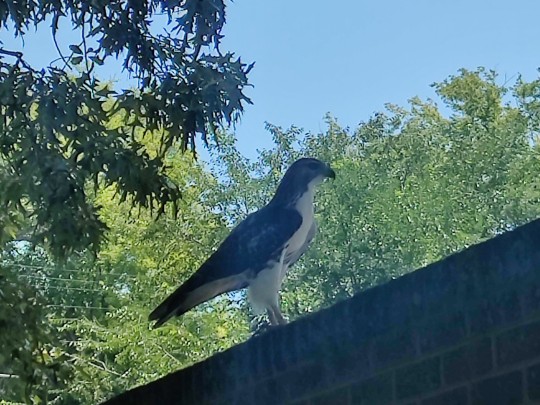
Anyway. Weird guy. Nearly shit my pants when I noticed a bird big enough to carry off a fully grown cat was just... there, staring me in the face, unwilling to move away from me, a human, something it should see as a threat. I watched behind me the whole rest of the way to my car, just in case this bird decided to help me shed this mortal coil. 10/10 experience. Super cool guy.
#not vc sorry#bird#birds#aves#raptor#hawk#red shouldered hawk#i think. might be wrong on that id#accipitriformes#birds of prey#honestly a really cool guy so close up#I'm happy i wasn't attacked. i would not want to fight a guy that big.#talons on this bird were huge. big scary.#I've never heard of large predatory birds just landing in front of people like that so i don't know what gives#it didn't catch any food or anything. just landed near me then stared me down.#I don't know a lot about bird behavior so i tried to not look back at it but still.#it also didn't look injured. seemed like a healthy bird#if anyone has any idea why this thing would act the way it did I'd love to know
28K notes
·
View notes
Text

#kirby#nintendo#gaming#cute#wholesome#video games#twitter#x#funny#lol#humor#meme#pancakes#food#japan#kirby cafe#kirby and the forgotten land#switch#nintendo switch#gameboy#nes#snes#retro#gamecube#retrogaming
948 notes
·
View notes
Text




giant african land snails (lissachatina reticulata) | paya_exotics on ig
#stim#snails#animals#giant african land snail#sfw#brown#beige#orange#white#food#gastropods#molluscs#tongs#water#lissachatina reticulata#hands free#ishy gifs#requests#postish
655 notes
·
View notes
Text
"In response to last year’s record-breaking heat due to El Niño and impacts from climate change, Indigenous Zenù farmers in Colombia are trying to revive the cultivation of traditional climate-resilient seeds and agroecology systems.
One traditional farming system combines farming with fishing: locals fish during the rainy season when water levels are high, and farm during the dry season on the fertile soils left by the receding water.
Locals and ecologists say conflicts over land with surrounding plantation owners, cattle ranchers and mines are also worsening the impacts of the climate crisis.
To protect their land, the Zenù reserve, which is today surrounded by monoculture plantations, was in 2005 declared the first Colombian territory free from GMOs.
...
In the Zenù reserve, issues with the weather, climate or soil are spread by word of mouth between farmers, or on La Positiva 103.0, a community agroecology radio station. And what’s been on every farmer’s mind is last year’s record-breaking heat and droughts. Both of these were charged by the twin impacts of climate change and a newly developing El Niño, a naturally occurring warmer period that last occurred here in 2016, say climate scientists.
Experts from Colombia’s Institute of Hydrology, Meteorology and Environmental Studies say the impacts of El Niño will be felt in Colombia until April 2024, adding to farmers’ concerns. Other scientists forecast June to August may be even hotter than 2023, and the next five years could be the hottest on record. On Jan. 24, President Gustavo Petro said he will declare wildfires a natural disaster, following an increase in forest fires that scientists attribute to the effects of El Niño.
In the face of these changes, Zenù farmers are trying to revive traditional agricultural practices like ancestral seed conservation and a unique agroecology system.
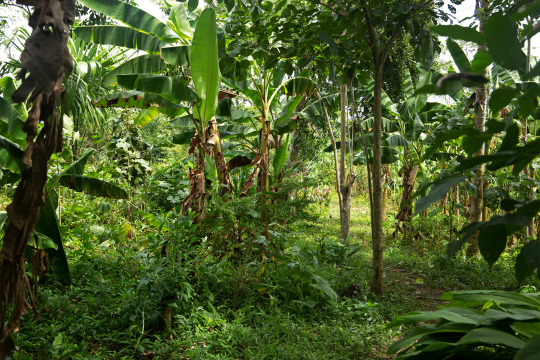
Pictured: Remberto Gil’s house is surrounded by an agroforestry system where turkeys and other animals graze under fruit trees such as maracuyá (Passiflora edulis), papaya (Carica papaya) and banana (Musa acuminata colla). Medicinal herbs like toronjil (Melissa officinalis) and tres bolas (Leonotis nepetifolia), and bushes like ají (Capsicum baccatum), yam and frijol diablito (beans) are part of the undergrowth. Image by Monica Pelliccia for Mongabay.
“Climate change is scary due to the possibility of food scarcity,” says Rodrigo Hernandez, a local authority with the Santa Isabel community. “Our ancestral seeds offer a solution as more resistant to climate change.”
Based on their experience, farmers say their ancestral seed varieties are more resistant to high temperatures compared to the imported varieties and cultivars they currently use. These ancestral varieties have adapted to the region’s ecosystem and require less water, they tell Mongabay. According to a report by local organization Grupo Semillas and development foundation SWISSAID, indigenous corn varieties like blaquito are more resistant to the heat, cariaco tolerates drought easily, and negrito is very resistant to high temperatures.
The Zenù diet still incorporates the traditional diversity of seeds, plant varieties and animals they consume, though they too are threatened by climate change: from fish recipes made from bocachico (Prochilodus magdalenae), and reptiles like the babilla or spectacled caiman (Caiman crocodilus), to different corn varieties to prepare arepas (cornmeal cakes), liquor, cheeses and soups.
“The most important challenge we have now is to save ancient species and involve new generations in ancestral practice,” says Sonia Rocha Marquez, a professor of social sciences at Sinù University in the city of Montería.
...[Despite] land scarcity, Negrete says communities are developing important projects to protect their traditional food systems. Farmers and seed custodians, like Gil, are working with the Association of Organic Agriculture and Livestock Producers (ASPROAL) and their Communitarian Seed House (Casa Comunitaria de Semillas Criollas y Nativas)...
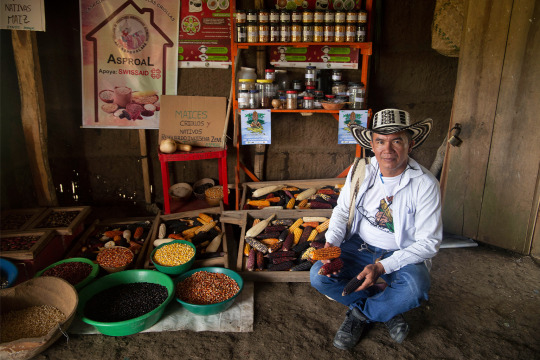
Pictured: Remberto Gil is a seed guardian and farmer who works at the Communitarian Seed House, where the ASPROL association stores 32 seeds of rare or almost extinct species. Image by Monica Pelliccia for Mongabay.
Located near Gil’s house, the seed bank hosts a rainbow of 12 corn varieties, from glistening black to blue to light pink to purple and even white. There are also jars of seeds for local varieties of beans, eggplants, pumpkins and aromatic herbs, some stored in refrigerators. All are ancient varieties shared between local families.
Outside the seed bank is a terrace where chickens and turkeys graze under an agroforestry system for farmers to emulate: local varieties of passion fruit, papaya and banana trees grow above bushes of ají peppers and beans. Traditional medicinal herbs like toronjil or lemon balm (Melissa officinalis) form part of the undergrowth.
Today, 25 families are involved in sharing, storing and commercializing the seeds of 32 rare or almost-extinct varieties.
“When I was a kid, my father brought me to the farm to participate in recovering the land,” says Nilvadys Arrieta, 56, a farmer member of ASPROAL. “Now, I still act with the same collective thinking that moves what we are doing.”
“Working together helps us to save, share more seeds, and sell at fair price [while] avoiding intermediaries and increasing families’ incomes,” Gil says. “Last year, we sold 8 million seeds to organic restaurants in Bogotà and Medellín.”
So far, the 80% of the farmers families living in the Zenù reserve participate in both the agroecology and seed revival projects, he adds."
-via Mongabay, February 6, 2024
#indigenous#ecology#agroforestry#agriculture#traditional food systems#traditional medicine#sustainable agriculture#zenu#indigenous peoples#farming#colombia#indigenous land#traditional knowledge#seeds#corn#sustainability#botany#plant biology#good news#hope#climate action#climate change#climate resilience#agroecology#food sovereignty
1K notes
·
View notes
Text
a feral pigeon (columba livia domestica) perched on my arm, ireland
#columbiformes#columbidae#columba#feral pigeon#rock dove#birds#pigeons#birdwatching#bird photography#display flight#this was from a year or two ago but thought i'd post it here lol#NO CLUE at all why it landed on my arm#i've held pigeons before when i have food to tempt them but i didn't that day#it stayed there for about a full minute lmao. i love you random pigeon hope you're doing well <3
547 notes
·
View notes
Text
Every once in a while I’ll see some posts about everyone should become vegan in order to help the environment. And that… sounds kinda rude. I’m sure they don’t mean to come off that way but like, humans are omnivores. Yes there are people who won’t have any animal products be it meat or otherwise either due to personal beliefs or because their body physically cannot handle it, and that’s okay! You don’t have to change your diet to include those products if you don’t want to or you physically can’t.
But there’s indigenous communities that hunt and farm animals sustainably and have been doing so for generations. And these animals are a primary source of food for them. Look to the bison of North America. The settlers nearly caused an extinction as a part of a genocide. Because once the Bison were gone it caused an even sharper decline of the indigenous population. Now thankfully Bison did not go extinct and are actively being shared with other groups across America.
Now if we look outside of indigenous communities we have people who are doing sustainable farming as well as hunting. We have hunting seasons for a reason, mostly because we killed a lot of the predators. As any hunter and they will tell you how bad the deer population can get. (Also America has this whole thing about bird feathers and bird hunting, like it was bad until they laid down some laws. People went absolutely nuts on having feathers be a part of fashion like holy cow.)
We’re slowly getting better with having gardens and vertical farms within cities, and there’s some laws on being able to have a chicken or two at your house or what-have-you in the city for some eggs. (Or maybe some quails since they’re smaller than chickens it’s something that you’d might have to check in your area.) Maybe you would be able to raise some honey bees or rent them out because each honey tastes different from different plants. But ultimately when it comes to meat or cheese? Go to your local farmers. Go to farmers markets, meet with the people there, become friends, go actively check out their farm. See how the animal lives are and if the farmer is willing, talk to them about sustainable agriculture. See what they can change if they’re willing. Support indigenous communities and buy their food and products, especially if you’re close enough that the food won’t spoil on its way to you. (Like imagine living in Texas and you want whale meat from Alaska and you buy it from an indigenous community. I would imagine that would be pretty hard to get.)
Either way everything dies in the end. Do we shame scavengers for eating corpses they found before it could rot and spread disease? Do we shame the animals that hunt other animals to survive? Yes factory farming should no longer exist. So let’s give the animals the best life we can give them. If there’s babies born that the farmer doesn’t want, give them away to someone who wants them as a pet. Or someone who wants to raise them for something else. Not everyone can raise animals for their meat. I know I can’t I would get to emotionally attached. I’d only be able to raise them for their eggs and milk.
Yeah this was pretty much thrown together, and I just wanted to say my thoughts and throw them into the void. If you have some examples of sustainable farming/agriculture, please share them because while I got some stuff I posted from YouTube, I’m still interested to see what stuff I might’ve missed!
#solarpunk#farming#hunting#agriculture#sustainability#sustainable farming#sustainable agriculture#like Rewilding farm land is pretty interesting and trying to replicate an ecosystem with farm animals but also allowing wild animals#to make homes in the rewild farm land is pretty cool#and I have an absolute love for food/garden forests#and hydroponics have shown to be really great for communities in the winter time and they want to have fresh produce#all sorts of cool stuff
941 notes
·
View notes
Text

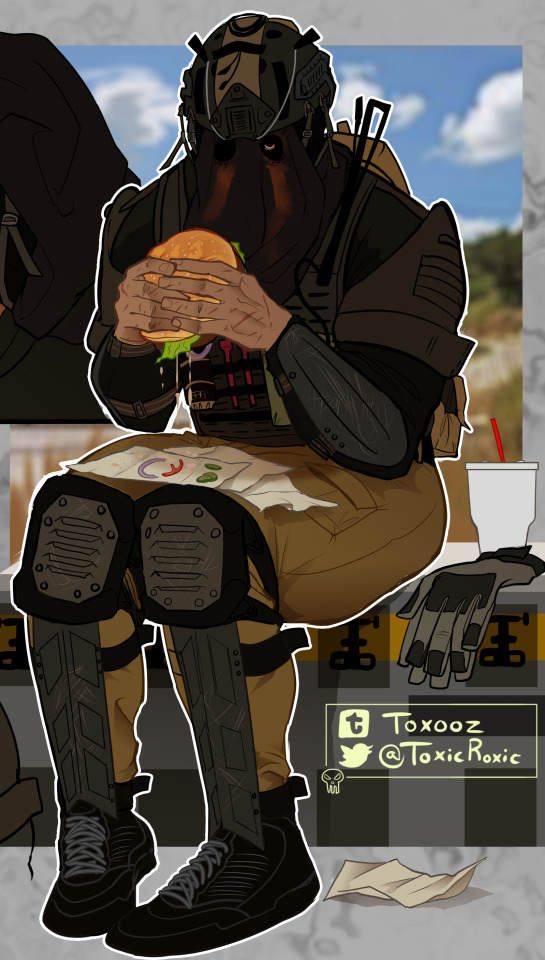

🍔 borgir 🍔
#könig#had this on my mind for months so that means im legally required to draw it#and also food is rlly fun to draw#aight im gunna answer them asks Eventually then imma draw one more drawing over in nfsw land long story short i want to get to the#next comic section by the end of next week IM DYINYGGG TO DRAW IT Out#my art#fanart#konig#konig mw2#call of duty modern warfare 3#call of duty modern warfare 2#call of duty#konig cod#food#body horror#body horror tw#teeth
851 notes
·
View notes
Text
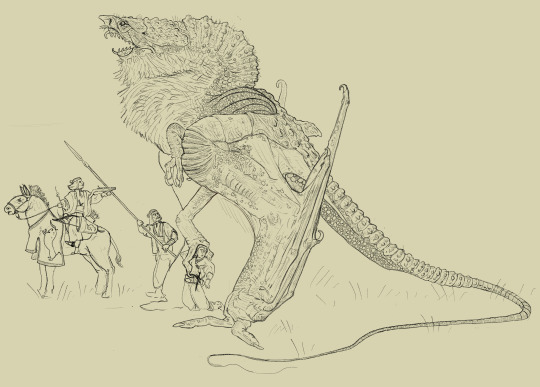
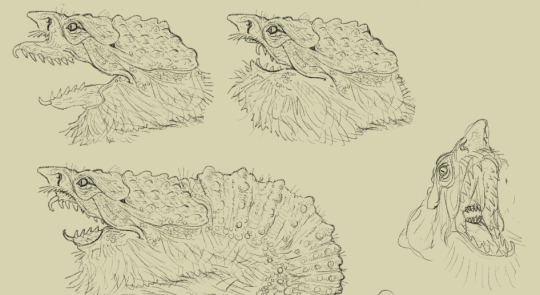
The Dragons:
When dragons arrived to the continent where the main story happens, a great crisis ensued. At that time, the continent was mostly under either direct control or in the sphere of influence of the Sun Empire (provisional and generic name). This empire rules over many ethnicities, religions and cultures in a tense peace held together with complex and pretty ineficient burocracy.
The first effort to kill a dragon made by the empire was a great failure rooted in miscomunication. A dragon landed near one of the northernmost frontier fortresses of the empire and made it's nest inside of the central tower.
Since comunication with this fortress was cut off and the empire had not yet noticed the dragons, it was asumed that the fortress had been invaded. A platoon of soldiers arrived to retake the fortress, hoping to find an invading tribe inside of it, unable to hold a siege.
What they found was a massive dragon mother that had just layed eggs and was very territorial and so the whole platoon of heavy infantry was killed.
News from the dragons kept coming to the capital, myth mixed with reality about how they ate cattle, people and even ships.
Platoon after platoon of imperial soldiers were sent to manage the dragons but they were either unable to track them or all killed uppon contact.
Many rural societies collapsed, and only those that could hide inside city walls were safe.
Soldiers sent to face the dragons usually deserted, and it was clear that the Empire didn't have the necessary tools to face the dragons.
Out of desperation, the empire offered an unusual reward: They would give away land and titles to whoever killed the dragons.
The dragon hunters ended up being the nomadic tribes of the northern steppe of the continent.
They used to live a life of herding, hunting megafauna and raiding southern settlements and were a constant nuisance to the empire.
Many times these tribal confederation tried to conquer the more fertile lands of the empire but were unable to hold any taken territories wich were quickly reconquered by the Empire.
Their territory was greatly affected by dragons and basically became their homeland. Dragons lived in the steppes hunting megafauna and seasonally came to the south to raid cattle.
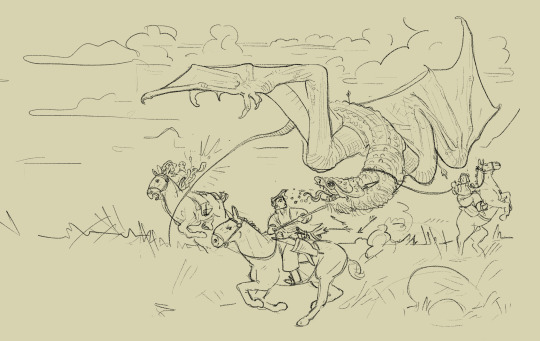
The slaying of a young dragon.
These tribes were very used to hunting megafauna and knew very well how to track an animal like a dragon and live off the land while they chased it.
They were also very motivated to get the reward and finally hold land and also getting rid of the dragon. These dragon unting groups were usually familial units with a very intuituve and respected hirearchy.
As they killed dragons the balance between these beasts and humans shifted. The hunters became more and more specialized and powerful after claiming the rewards. On the other hands, killing the dragons reduced intraspecies competition so the surviving dragons became very big, smart and weary of humans.
This is how one of these late specialiced hunts would go.
A very large group of hunter would be needed, about 12 hunters per se plus their replacements and squires. Also, a large but mobile caravan. Scouting groups would be ahead while the rest of the caravan follows them at a distance and gathers food and such.
The main strategy is to tire out the dragon until it can't fly off anymore and then try to kill it on the ground.
Here are some specialized types of hunters.

On the left: A grappling lancer. They use these lances with a frail tip, meant to break off after penetrating the skin of the dragon and remain inside the wound. The metalic tip is tied to a strong rope with a net or hooks at the end of it. The hooks are ment to get tangled to the rest of the body, branches or the ground. This way, if the dragon tries to run away, fly off or simply move, it would pull from the wound and be very painful and disorienting. A single one is not going to immobilize the dragon but 10 or 15 might.
On the centre: A blunt unit. These are meant to strike the wings of the dragon with a long mace to break their bones and also carry a blade to lacerate the wing membrane. Since they come very close to the dragon, they are very well covered against its acid.
On the right: A shocker. Their pourpose is to distract the dragon and overwhelm it. Their horse is decorated with bells and colorful feathers. They play horns and wistles and carry hand cannons. (I will talk about the technology of the world in another post) The cannons would be preloaded and they would shoot all of them as quickly as posible, aiming to the eyes or neck. These would not kill the dragon, but they would be painful, bright and noisy. This unit plays a semi-religious role and have the riskiest position since the other ones attack and retreat to prepare for the next attack while the shocker always stays closer to the dragon. They sometimes attack semi or fully nacked since they embrace the danger and death during the hunt is considered very noble.
Archers would also be present but I didn't draw them.
The fatal blow is done with a strong lance and usually reserved to the tribe chieftan.
The religion of these nomadic tribes is polytheistic but the tribes that specialized in hunting dragons shifted to prioritizing their godess of the hunt.
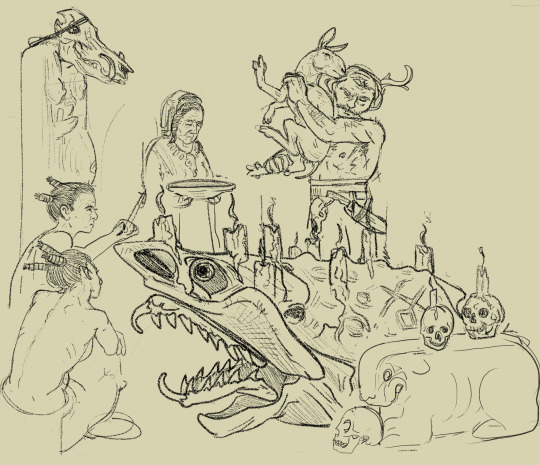
When a dragon is hunted it's skull must be given to imperial officials to prove it was hunted and so that it can be measured since the reward depends on the size and age of the dragon. Carrying the skull back to civilisation is sometimes more dangerous than hunting the dragon since many people would want to steal it.
Once these tribes settled into castles, the dragon skulls are kept in shrines, next to the skulls of those that hunted it. This is because in their religion, they believe thet the beasts their ancestors hunter would guard them in the afterlife. This is also meant to show off the power of these clans.
In the image we can see a dragon skull being used as a shrine for a sacrifice meant to bless a future hunt. On the left there is a statue of the godess of hunt and abundance and on the foreground a simple protective bear statue.
In conclusion, after about a century since they first arrived dragons became extinct and power in the continent shifted fro the centralized power of the emperor to local dragon slaying feudal nobility that coexist with the emperor in a strange balance where the nobles hold most of the military and agricultural power while the lands of the emperor legitimize the noble's power and also dominate in trade and religion.
If you read this all the way thank you and sorry for the chaotic writting. I hope you enjoyed these and ideas and questions are eagerly welcome.
#idk if I emphasized enough the logistic hell of dragon slaying#like each expedition could last almost a year of just chasing the dragon#and while following them they would traverse lands similar to a 6th century wild west#hunters would need to negotiate with local tribes find food and avoid dangerous creatures and bandits#coordination from within the group would be esential#worldbuilding#fantasy worldbuilding#spec evo#creature design#fantasy art#spec bio#art#concept art#fantasy#dragon#lore#dragon hunters
161 notes
·
View notes
Text
Rhaenyra sends a boat of food past the blockade and it's framed as a politically smart maneuver as if it wouldn't just highlight that she has full control over the blockade and it's because of her that there's no food for anyone in the city 🙄
#*she thinks of us even now* bro she's blatantly using you as a tool. you're killing each other over it. and she is causing the whole problem#please anyone explain how this was a good move#aside from *well it worked!* please think beyond what the weak writing is whacking you over the head with#hotd critical#anti hotd#btw the city should NOT be having food issues KL gets its food by land from the Reach#the writers just don't know what they're doing
388 notes
·
View notes
Text


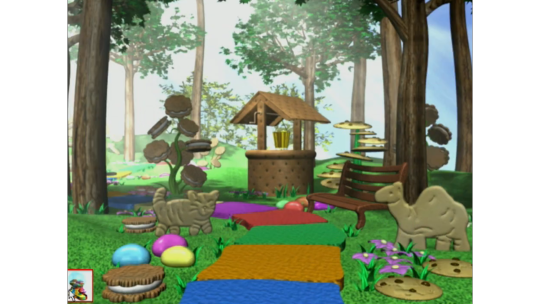

Candy Land PC Game! 🌈
274 notes
·
View notes
Text


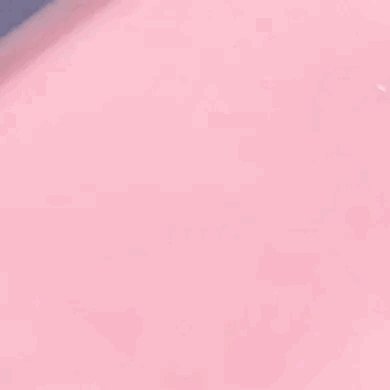


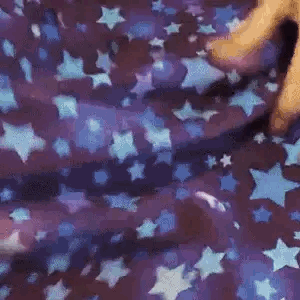


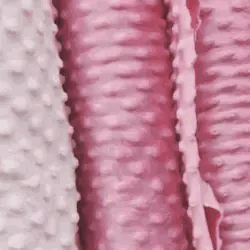
sleepy kirby stimboard 😴
x - x - x | x - x - x | x - x - x
#i’m so tired…. sssnnnzzzzzz#mine🦭#kirby#kirby stim#kirby stimboard#kirby and the forgotten land#pink#blue#fabric#dice#liquid#mirror cake#slime#water slime#food#candy#blanket#pillow#pastel#stim#stimboard#stimming#stimblr#stim gifs
286 notes
·
View notes
Text
passing out an orange slice to the homies

I'm so fucking lucky that I've still got parents who will do the cut fruit thing when im ill i stg
568 notes
·
View notes
Text








Dishes from the Kirby Café in Tokyo, Japan
#kirby#nintendo#food#gaming#video gmaes#cute#kawaii#japan#tokyo#popopo#kirby and the forgotten land#switch#nintendo switch#video games#waddle dee#cafe#yumblr#retro#travel#art#wholesome#retrogaming
799 notes
·
View notes
Text

#anthropomorphic#anthropomorphism#food#mascots#food mascots#gotta be one of my favorite genders#skylanders#skylanders trap team#don't hug me i'm scared#bananas in pyjamas#candy land#uncle grandpa#mr. potato head#mr potato head#kid icarus#regular show#sausage party#the amazing world of gumball#adventure time#fortnite#the grim adventures of billy and mandy#mc donalds#gudetama#twinkies#hershey park#kool aid#california raisins#a pup named scooby doo#memes#funny memes
132 notes
·
View notes